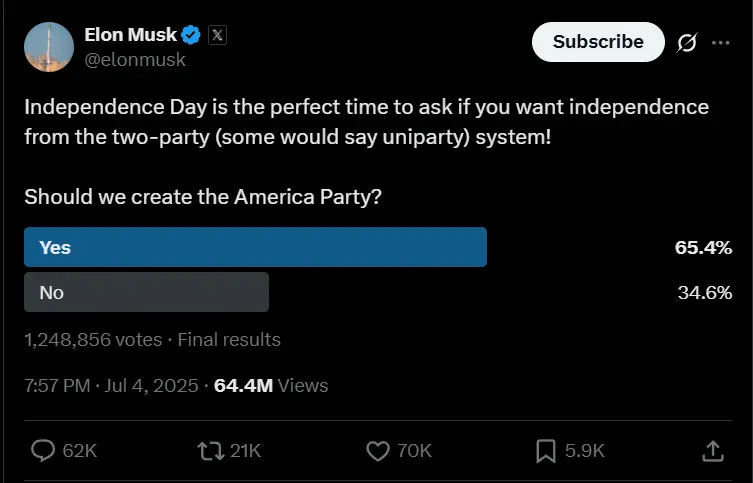Tech billionaire Elon Musk announced the formation of a third party in U.S. politics, dubbed the America Party, this weekend on his social media platform X. The move marks a dramatic departure from his recent role as a major backer and adviser to former President Donald Trump, stemming from Musk’s fierce opposition to Trump’s “Big Beautiful Bill” that Musk warned would “bankrupt our country”.
What Is Elon Musk’s America Party?
Musk framed the America Party as a challenge to an entrenched “uniparty” of entrenched Democrats and Republicans. Citing widespread support—65 % out of 1.2 million votes in an X poll—he declared, “Today, the America Party is formed to give you back your freedom”.
Although America Party Elon Musk emphasized fiscal conservatism, debt reduction, deregulation, and free trade, he provided scant details on formal organization, leadership, or legal registration with the Federal Election Commission (FEC).
Targeting Swing Districts
Musk hinted the America Party would focus strategically in the 2026 midterms on “two to three Senate seats” and eight to ten House races, aiming to act as a decisive swing bloc in closely contested votes.
He pledged early support for fiscally conservative Republicans like Rep. Thomas Massie, though key details on candidate recruitment, campaign funding, or ballot access remain uncertain: “He has not yet outlined a plan”.
Huge Political Challenges Ahead
Political analysts caution the America Party faces steep obstacles:
-
Legal Barriers: U.S. ballot access laws vary by state and are notoriously difficult for independent parties.
-
Institutional Resistance: The Electoral College and entrenched party advantages hamper third-party breakthroughs.
-
Messaging & Organization: Critics note the party lacks clear ideology beyond fiscal restraint and anti-establishment rhetoric.
Experts stress that even with Musk’s resources, “seriously difficult” logistics and historical precedent may stall the effort.
Establishing a national third party in the U.S. poses significant challenges. Legal experts note the complexity of ballot access across states, each with unique requirements for recognition, membership, and electoral thresholds. Moreover, historical attempts—such as those by Ross Perot and the Progressive Party—underscore the steep uphill battle faced by such efforts. Analysts argue that, absent a nationwide infrastructure, the America Party may focus on a few targeted races in the midterms instead of mounting full-scale campaigns.
A Break From Trump
Musk’s announcement comes on the heels of a public feud with Trump over the “Big Beautiful Bill”, a massive $3.3 trillion tax and spending package that Musk slammed for deepening the national debt.
Trump retaliated by threatening to cut federal contracts to Musk’s companies and described Musk’s government efficiency office as a potential liability. Republicans worry Musk’s America Party could siphon conservative votes, potentially aiding Democrats in tightly contested districts.
Polling Reaction & Public Interest
A recent Independent poll shows approximately 40 % of Americans would consider supporting a third party aligned with Musk, while 38 % said “no” and the rest were undecided.

Political centrist figures like Andrew Yang, founder of the Forward Party, expressed interest in collaborating with Musk’s initiative, potentially bolstering credibility.
With Musk’s immense personal wealth (estimated at over $350 billion) and the capacity to self-fund, the America Party possesses financial advantages most third-party figures lack. However, even unlimited funding doesn’t guarantee organizational strength or electoral success, and past independent campaigns have usually faltered without deep-rooted donor bases and grassroots mobilization.
Can the America Party Survive?
The launch of the America Party Elon Musk channels growing dissatisfaction with the two-party system. It combines fiscal conservatism with libertarian leanings and appeals to centrist voters disillusioned with partisan gridlock.
Yet the two-party system’s deep-rooted infrastructure, complex election laws, and skepticism toward third-party viability present daunting challenges. As historical examples like Ross Perot and the Forward Party show, breaking that mold demands more than money—it requires a sustainable movement, strong candidates, and clear purpose.
Only time will reveal if Musk’s bold political gamble reshapes American governance—or remains an ambitious footnote fueled by wealth and spectacle.




